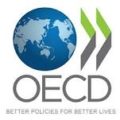Environmental Economists/Policy Analysts
JOB DETAIL
The Organisation for Economic Co-operation and Development (OECD) is an international organisation comprised of 38 member countries, that works to build better policies for better lives. Our mission is to promote policies that will improve the economic and social well-being of people around the world. Together with governments, policy makers and citizens, we work on establishing evidence-based international standards, and finding solutions to a range of social, economic and environmental challenges. From improving economic performance and creating jobs to fostering strong education and fighting international tax evasion, we provide a unique forum and knowledge hub for data and analysis, exchange of experiences, best-practice sharing, and advice on public policies and international standard-setting.
The OECD Environment Directorate (ENV), in line with the strategic objectives of the Secretary‑General, provides relevant and timely information, analysis and advice to support governments in identifying and implementing the environmental policies needed to support a cleaner, more resource-efficient and low-carbon green growth path. The Directorate currently comprises approximately 175 staff members (economists, statisticians, scientists, engineers, administrative staff, consultants and trainees) working across a broad range of environmental issues such as: green growth, climate change, biodiversity, water, eco-innovation, circular economy, resource productivity and waste, environmental policy tools and evaluation, safety of chemicals, biotechnology and nanomaterials, and linkages between environment and tax, agriculture, transport, development assistance, trade and investment policies. For more information, please refer to www.oecd.org/env.
The Environment and Economy Integration Division (EEI) is looking for several Environmental Economists/Policy Analysts. The EEI Division is undertaking work on interactions between trade and environment policy, circular economy and resource productivity, environment-economy modelling, environmental policies and economic outcomes, spatial planning, greening of mobility and transport, and on cost benefit analysis. The selected candidate(s) will support the EEI team with empirical and qualitative analysis on the environmental effectiveness and economic efficiency of policies in support of environmental objectives, to promote resource efficiency and the transition to a more circular economy.
Main Responsibilities
- Identify key research questions on environmental and economic policy interactions in specific topics, such as circular economy, valuation of adverse health impacts of environmental pollutants, environmental innovation, environmental justice, and trade and environmental policy.
- Apply state-of-the-art quantitative and econometric methods to empirically investigate the effects of different policy instruments on economic and environmental outcomes.
- Develop the necessary analytical, empirical and data foundation to address the environmental and economic policy interactions including contributing to data collection efforts.
- Effectively communicate research findings to a diverse audience, with a particular focus on a policy audience.
- Represent the OECD at internal and external meetings, organise technical meetings and workshops with diverse stakeholders, and contribute to communication activities including briefings for senior management.
- Develop and maintain partnerships with institutions working on environmentally-related subjects in OECD Member countries and beyond.
- Communicate effectively the results of the OECD work to a wide audience of policymakers.
Ideal Candidate Profile
Academic Background
- An advanced post-graduate university degree (Ph.D. preferred) in environmental or resource economics, environmental sciences, or a related discipline. A strong quantitative background would be an asset.
Professional Background
- Minimum three, preferably five to seven years of experience in applied economics analysis, preferably within a research organisation, government or an international organisation.
- Strong quantitative skills and demonstrated experience in developing the analytical, empirical and data foundation in response to identified research questions.
- Demonstrated experience in economic analysis of policy instrument choice for addressing environmental concerns and the relationship with key areas such as transport, land use, resource efficiency and technological innovation.
- Experience in organising technical discussions and events.
- Proven ability to draft analytical and/or policy-relevant papers that are clear, concise, reader-friendly and tailored to the audience.
Tools
- Excellent knowledge of common statistical and econometric packages (particularly Stata and R) would be an asset.
Languages
- Excellent communication skills, including the ability to explain technical economic issues and analysis in a manner understandable to experts and lay audiences alike.
- Fluency in one of the two OECD official languages (English and French) and a knowledge of, or a willingness to learn, the other.
Core Competencies
- Please refer to the level 3 indicators of the OECD Core Competencies. For this role, the following competencies would be particularly important: Analytical thinking, Achievement focus, Drafting skills, Flexible thinking, Strategic thinking, Team work.
Contract Duration
- One year fixed term appointment, with the possibility of renewal.
- Depending on level of experience, monthly salary starts at either 6 672.15 EUR or 8 232.66 EUR, plus allowances based on eligibility, exempt of French income tax.
- Please note that the appointment may be made at a lower grade based on the qualifications and professional experience of the selected applicant.
- Click here to learn more about what we offer and why the OECD is a great place to work.
- Click here to browse our People Management Guidebook and learn more about all aspects relating to people at the OECD, our workplace environment and many other policies supporting staff in their daily life.
Selection Process
For retained candidates, written tests/video-recorded interviews are foreseen mid-June and panel interviews are planned for early July.
Please note that our Rules and Regulations stipulate that the mandatory retirement age is 65.
The OECD is an equal opportunity employer and welcomes the applications of all qualified candidates who are nationals of OECD member countries, irrespective of their racial or ethnic origin, opinions or beliefs, gender, sexual orientation, health or disabilities.
The OECD promotes an optimal use of resources in order to improve its efficiency and effectiveness. Staff members are encouraged to actively contribute to this goal.


